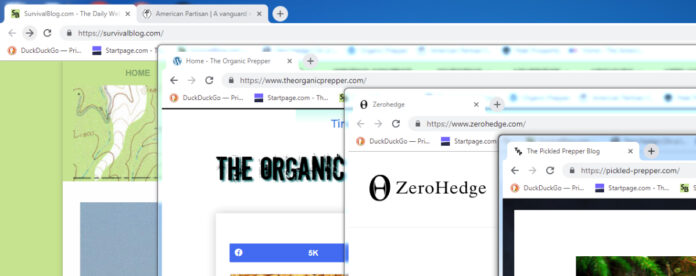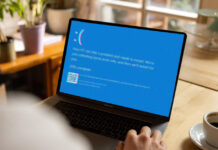Given the current political climate and culture, you may be worried that visiting prepping websites, firearm-related web sites, or other websites with a conservative bent may come back to haunt you in your personal or professional lives. I’m going to give you some ways to increase your online privacy and keep others from learning your browsing history.
When you visit a website, there are multiple parties that know you have been there, including:
- You and anyone who can access your computer’s history. (If you surf from work, you can be sure your employer or IT department knows or can instantly find out.)
- Possibly your browser and its provider, such as Google
- Your Internet Service Provider (ISP), such as your cable company or in the case of your phone, your wireless carrier.
- The website you visit.
- The website’s host or server farm, who likely has your visit recorded in their logs
- Google, Bing or another other search engine that directed you there as well as any other website that had a link you clicked on to visit it.
- Any advertisers on the site, or re-marketing companies that use what are called third-party tracking cookies. This likely include Google and Facebook.
To protect yourself, you need to stop or block every one of these parties. Below are some suggestions on how to block them.
Don’t Surf on Your Phone or Tablet
First, don’t visit these sites on your phone. Use a laptop or a desktop computer instead. Your phone is probably filled with apps sharing information who knows how many third parties. Yes, you can get a VPN on your phone, but some of the other tips we will talk about work best on actual computers rather than mobile devices.
Along similar lines, don’t surf these sites at work.
Don’t Log in with Social Media or your Email
Never use your social media, Gmail address, or other social media ID to automatically log in to another website. You do not want these massive companies who excel in data collection to know where else you visit. They are already tracking you – don’t make it any easier on them.
If you can visit a website, forum or other site without logging in, do so. If you have to provide an email address, use a throw-away email address that is not associated with you. This means don’t use the same email address you use to correspond with your friends, login to your bank, pay your electric bill, etc. If your main email is [email protected] don’t use it to login or post at a website that the Biden administration or the cancel culture folks might object to. You want to be as anonymous as possible. I would go so far as to say pick something unlike you. For example, if you have a big head of hair, register as “Bald Prepper.” (I also never give my true birthday when sites want it.)
In fact, you could go so far as to have your day-to-day identity that you use on common websites and a “secret” identity that you use on prepper and other politically incorrect website. That might be easy, but it also means that if someone ties your to that identity on site one, your posts under the same name on a different forum will also be tied to you. Keep in mind how easy it was for people to tie Pierre Delecto to Mitt Romney and Carlos Danger to Anthony Weiner.
My advice is to use different, unrelated names on each site. For example, in addition to Bald Prepper, you could use the name of a historical character on another website and a literary character on a third. There’s also nothing wrong with a common name followed by random numbers, like Bill72396. If someone assumes 72396 is your zip code, let them, unless you are from Arkansas, in which case pick another number
Increase Your Browser Security
I recommend using a mainstream browser like Chrome, Firefox, or Safari for your everyday surfing and a lesser-known browser such as Brave of Chromium for the browsing you would prefer to keep private.
If your browser has a “don’t track me” setting, by all means turn it on, but don’t expect it to provide complete protection. To futher enhance your security, you will want to add some browser extensions like Disconnect or Privacy Badger to ensure privacy and stop tracking. I also use an ad blocker and the HTTPS Everywhere extension. You may find that running these extensions impedes the performance of certain websites, but you can whitelist or unblocked them. It may also subject you to using the Captcha and answering security questions more often, but to me that is a small price to pay.
Most browsers have a private or incognito setting. Browsing in the incognito or private mode does not actually make your internet use private or secure, but it does help limit tracking and keeps cookies from persisting. Using private mode is not a bad idea and may protect you from casual snoots, but it is not a stand alone solution.
Clear Your Cookies
I recommend deleting or clearing your browser history, cookies and cache after every session or at least once a week. If you use a special browser for your “special” surfing, this is easy and quick and won’t interfere with your normal online activities. I would also avoid bookmarking sites because bookmarks persist after you clear your cache.
How to us a VPN
VPNs were originally used to let someone securely connect to a computer network from an external location. They create a private “tunnel” through the public internet that encrypts and protects the data being transmitted. VPNs are still useful if you surf on a public WiFi or through a hotel connection, but more and more people are using them to stop their ISP from collecting and selling data on their browsing activity.
Your ISP maintain logs, or records, that show where you surf. When you connect to a VPN, all your traffic is not only encrypted, but as far as your ISP can see, it goes only one place. This helps render your ISP’s logs useless for tracking you.
There are many VPN services out there; do your research and by research, I mean look at what leading computer magazines say, not just who is paying the most to get a top search result on Google.
When selecting my VPN, I wanted one that was not based in Russia, China or the U.S. My top choice would be one in a Scandinavian country or similar location that is not going to immediately cooperate with the U.S. government. I chose NordVPN and it is very fast and keeps not logs, but I wish it had more than 15 U.S. cities on their server list. Using NordVPN, I can look like I am surfing from any one of more than 50 countries, including Slovenia, Thailand, Moldova, Japan, Israel, Australia, or Costa Rica. I have also heard good things about VyperVPN and their Chameleon system.
Most VPNs are just a few dollars a month and well worth the investment. Don’t use a free VPN because they may sell data to make money, and that’s the last thing you want.
VPN Set Up Suggestions
Once you get your VPN set up, I recommend you do the following:
- Change the server and city you connect to a couple times a day and don’t connect to something like Gmail from the same VPN address you use when you are searching those sites you want to keep private. Doing so may allow someone to tie you to that IP address.
- Use an IP geolocation service occasionally to test your connection. For example, go to iplocation.net and it will tell you what IP address and city will be reflected in the logs of the website you visit. Right now, mine says I am in Seattle even though I am not on the West Coast. Later, it will look like I am surfing from Toronto or perhaps St. Louis.
A More Complicated Solution
The best solution is to do all of the above and surf exclusively from a thumb drive that you can unplug, hide, lock up, or destroy if you need to. There are a number of ways to do this.
For example, I have a thumb drive with the browser Chromium on it. This is an open-source browser that, yes, is related to Google, but it is not Chrome and is privacy focused. In fact, Chromium is the browser that Brave is based on. The browser launches from the thumb drive and all its records are stored there. The VPN software is also on it. I can take the thumb drive with me and in a few clicks surf with relative security and privacy regardless of what computer I use.
I also have a thumb drive that has Ubuntu, a version of Linux, on it. When you boot your PC from the thumb drive, it launches Ubuntu and not Windows. The Ubuntu operating system uses your computer processor and memory, as well as some peripherals, but if properly set up, it will not write data on your hard drives and just save things to your thumb drive (so get a big one). If you are sophisticated enough to set this up, you can run a Linux browser and visit all the sites you want with no data recorded on your home computer.
For added protection, consider encrypting the data on your thumb drive and using a long and unusual password that no one who knows you can guess.
Nothing is 100 Percent Secure
Just remember than nothing you do, even if you choose to use the TOR browser (a topic for another day), can make you 100 percent secure, safe and private. All the above can do is make it more difficult, often far more difficult, to associate you and your name with what some might consider questionable websites.
Is there a risk in visiting prepper websites? I don’t think so. Hell, not only do I visit many, I own and operate one, and if I was worried that this would put me on some kind of list of people to be rounded up and arrested, you can bet I wouldn’t.
Prepping is something you should not talk about or broadcast to the general public, so I see no harm in not using your name on prepper websites and bulletin boards. In fact, keep your mouth shut about your preps, don’t tell your idiot brother-in-law, the gossipy neighbor, or the loud mouth at work.
Is there a risk visiting firearm-related, conservative, political, Trump-related, or other websites that cover topics that would get you banned from Twitter or Facebook? There should not be, but these days, who can be sure? We have the First Amendment right to free speech, but it also appears that we have the thought police straight from George Orwell’s 1984. I expect in time things will calm down and our society will move on, but if it doesn’t, then not having evidence on your computer can only help you.
Don’t be That Guy
How many times have you heard about a murdered who asked Google how much rat poison does it takes to kill someone or something similar? If by bad luck you happen to be at a location where something explodes, you don’t want to have a digital trail that says you visited a bomb-making website three months beforehand.
My advice is to use some or all of the above techniques, be discreet, keep a low profile, don’t blab about your activities on social media, and avoid doing or talking about illegal activities that could draw law enforcement’s attention. At the very least, that should be sufficient to keep your employer form firing you because of your beliefs or a post that was misinterpreted.
Pete would like to remind you that Internet security is a moving target and he is not an IT specialist or a security expert. you should use the information in this article as a starting point and conduct your own research to select the products or solutions you think are best for your particular situation.








